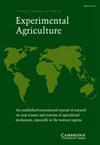Sustainability assessment methodology oriented to soil-associated agricultural experiments
IF 1.9
4区 农林科学
Q1 Agricultural and Biological Sciences
引用次数: 0
Abstract
Summary A variety of established tools are available for agricultural sustainability assessment at global, regional, and farm geographical scales. However, no assessment has been reported in research literature to indicate their ability to provide insights about the most sustainable cropping system at plot level or experimental unit. Despite the environmental and social importance of soil in agricultural systems, many of the sustainability assessments use few or no indicators related to soil properties or processes. Hence, we propose a sustainability assessment methodology oriented to soil-associated agricultural experiments (SMAES) by defining its parameters through simulations and testing the methodology with real data from a fertilization tomato experiment with five treatments: chemical control (CR); organic control (OR); and organic:chemical ratios (OR) of 25:75, 50:50, and 75:25. The distance from the maximum, principal component analysis, and product of weighted indicator techniques were chosen for normalization, weighting, and aggregation in a single index process, respectively. Applying the SMAES methodology, the sustainability level of the treatments followed this sequence: CR (0.95) > O25:C75 (0.73) > O50:C50 (0.60) > O75:C25 (0.55) > OR (0.45). The proposed SMAES methodology allows soil researchers to define the best treatment through the interaction of the environmental, social, and economic dimensions of agricultural systems.面向土壤相关农业试验的可持续性评价方法
在全球、区域和农场地理尺度上,已有各种成熟的工具可用于农业可持续性评估。然而,研究文献中没有任何评估报告表明它们有能力在地块水平或试验单位提供关于最可持续种植制度的见解。尽管土壤在农业系统中具有环境和社会重要性,但许多可持续性评估很少或根本没有使用与土壤性质或过程有关的指标。因此,本文提出了一种面向土壤相关农业试验(SMAES)的可持续性评价方法,并通过模拟确定了SMAES的参数,并用5个处理(化学控制(CR);有机控制(OR);有机:化学比例(OR)为25:75、50:50和75:25。选择与最大值的距离、主成分分析和加权指标技术的乘积分别在单一指标过程中进行归一化、加权和汇总。应用SMAES方法,各处理的可持续性水平依次为:CR (0.95) >O25:C75 (0.73) >O50:C50 (0.60) >O75:C25 (0.55) >或(0.45)。提出的SMAES方法允许土壤研究人员通过农业系统的环境、社会和经济维度的相互作用来确定最佳处理方法。
本文章由计算机程序翻译,如有差异,请以英文原文为准。
求助全文
约1分钟内获得全文
求助全文
来源期刊

Experimental Agriculture
农林科学-农艺学
CiteScore
2.50
自引率
6.20%
发文量
29
审稿时长
24 months
期刊介绍:
With a focus on the tropical and sub-tropical regions of the world, Experimental Agriculture publishes the results of original research on field, plantation and herbage crops grown for food or feed, or for industrial purposes, and on farming systems, including livestock and people. It reports experimental work designed to explain how crops respond to the environment in biological and physical terms, and on the social and economic issues that may influence the uptake of the results of research by policy makers and farmers, including the role of institutions and partnerships in delivering impact. The journal also publishes accounts and critical discussions of new quantitative and qualitative methods in agricultural and ecosystems research, and of contemporary issues arising in countries where agricultural production needs to develop rapidly. There is a regular book review section and occasional, often invited, reviews of research.
 求助内容:
求助内容: 应助结果提醒方式:
应助结果提醒方式:


